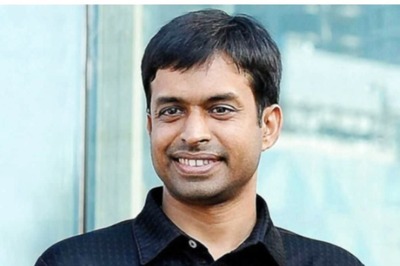
views
Once, Gautama, a disciple of Mahavira asked: “Bhagwan, what does one gain from Kshamapana?” To this, the Lord responded: “Kshamapana brings a sense of joy and peace to the soul.”
Culminating in the day of Bhagavati Samvatsari, the most significant festival for the followers of Jainism is the Ashtanhika Paryushan Parvadhiraj that is intrinsically linked to the practice of kshamapana, or forgiveness.
According to Acharya Mahashraman, who is the eleventh acharya and supreme head of the Jain Śvetāmbara Terapanth sect, this Jain tradition of forgiveness is unique in itself. On the occasion of Paryushan Parva, which concluded on Saturday (September 7), he explained the importance of the great festival saying where there is enmity or anger, joy cannot exist; however, where forgiveness and friendship are present, a sense of joy and peace prevails.
He said the outcomes of kshamapana can be understood through four points: internal happiness; establishment of friendship towards all living beings; purity of emotions; and fearlessness. This is the significant journey from forgiveness to fearlessness, he added.
‘Exchange of forgiveness essence of Kshamapana Day’
Forgiveness is a great virtue and a quality that purifies the soul, said Acharya Mahashraman. Just as there are negative tendencies in a person, there are also those that are positive and, while anger exists inside, so does the ability to forgive, he said. He explained this using a Sanskrit verse:
“क्षमा खड्गः करे यस्य, दुर्जनः किं करिष्यति? अतृणे पतितो वह्निः, स्वयमेवोपशाम्यति॥” (He who wields the sword of forgiveness cannot be harmed by even the most wicked. Just as a fire that falls on grassless ground extinguishes itself, so does the fire of anger die down in the presence of forgiveness)
He said this means that those who carry forgiveness, cannot be harmed. If you remain forgiving and peaceful, the anger of others will not be fuelled and will eventually die down, he added.
He used another famous Vedic verse in the context of kshamapana:
“खामेमि सव्व जीवे, सव्वे जीवा खमंतु मे, मित्ती मे सव्वे भूएसु, वेरं मज्झं न केणई।” (I forgive all living beings, and may all living beings forgive me. I hold friendship towards all creatures. I harbour no enmity towards anyone)
This exchange of forgiveness is the essence of ‘Kshamapana Day’, as the emotion behind this verse represents “an ocean of forgiveness” and the more you can take from it “the more it feels like drops of nectar”, he said.
“We live in a collective society, where small clashes are inevitable, just like noise between utensils when they touch. In our practical lives, misunderstandings may arise, leading to hurt feelings, either knowingly or unknowingly,” he added.
The acharya said such incidents can create knots within our hearts but you must strive to untie them as quickly as possible to lighten the burden. Hence, he said, this festival is an opportunity to open those knots and, over the year, any bitterness or harshness that has accumulated in our consciousness should be cleansed on the occasion of ‘Bhagavati Samvatsari’ with “the soap and water of forgiveness, leaving our consciousness pure and clear”.
What is the concept of ‘kshamapana’?
Kshamapana is like a great spiritual cleansing and purification of the soul. The festival is an occasion in the year where everyone seeks mutual forgiveness, making it a significant annual spiritual festival in Jain tradition. It is as though this is the final opportunity — if one does not forgive on ‘Samvatsari’, when will they?
Acharya Mahashraman said if the knots of anger and enmity remain for over a year, whether you are a monk or a layperson, it can be said they are not suitable for spiritual practice or right thinking. Hende, the ‘Samvatsari Mahaparv’ is a festival to end feelings of enmity, he said.
He said you should seek forgiveness not only mentally, but also practically in daily interactions. This is because while internal forgiveness is essential, there is no way for the other person to know that they have been forgiven or that you have sought forgiveness, he added.
The acharya further said, therefore, it is important to directly ask for forgiveness from those with whom you have had interactions, especially those involving conflict. In society, people from different classes, castes, communities and religions live together, he said.
“While there may be differences in opinions and beliefs, these differences should not create divisions in our hearts. We may disagree on thoughts, but there should be no hostility or ill will between us,” he said.
Bringing in the ancient saying of Vasudhaiva Kutumbakam (the world as one family), he said the message of forgiveness resonates globally and can bring about a beautiful transformation in today’s world. If the emotional inspiration of ‘Bhagavati Samvatsari’ could reach even warring nations, they might be encouraged to resolve their conflicts and establish mutual friendship, he said.
“For where there is forgiveness, there can be peace. Forgiveness is crucial not only for living a peaceful life but also for the purity of our individual consciousness,” he added.
(Yuvraj Pokharna is an independent journalist and columnist. He tweets with @iyuvrajpokharna)



















Comments
0 comment